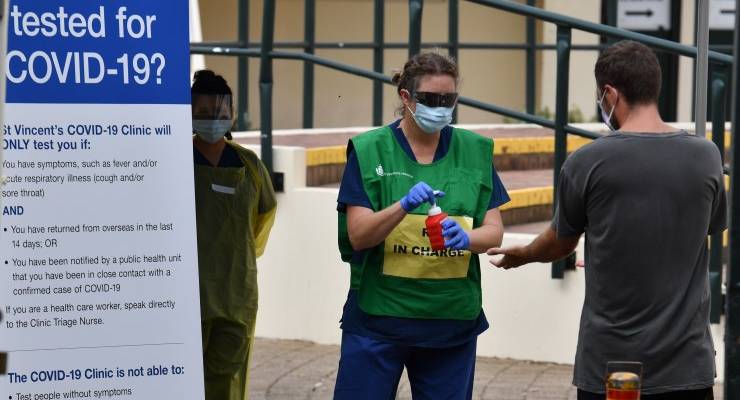
There are surely some doctors and police happier not ordering people about or advocating and employing strongarm tactics to enforce social distancing and isolation. If they exist, we rarely hear about them.
Likely they are keeping their heads down to avoid being accused of undermining public health. Anyone not in favour of harsh measures is suspect.
This has always been a favourite tactic of authoritarians. Take a hard line and repeat it constantly to silence dissent. Hard line measures have an internal logic: when facing extreme danger only extreme measures can keep us safe. Anyone who questions them therefore endangers our safety.
But wait, aren’t harsh measures working? Aren’t we “flattening the curve” — slowing the COVID-19 infection rate?
Signs are indeed promising. Physical distancing slows the spread of a virus.
But does flattening the curve require flattening freedom? Should it mean army patrols in city streets? Or police fining and threatening Australian citizens for eating a kebab or sitting in a car without a reasonable excuse? Michael Bradley has been chronicling the assault on freedom in Crikey.
The retrospective justification for harsh measures is that they are working. Even if correct, is this sufficient justification? Demonstrating the effectiveness of one particular option is never proof that it is the only or the best option.
Distancing can be achieved through polite encouragement and social norms (as in Sweden). Or if we want laws, we could at least enforce them nicely (as in New Zealand).
We do not know what other options have been considered. We are led to believe that shutting down the economy and harassing kebab-munchers is the only way to deal with COVID-19.
If options were put forward that did not involve cracking down on personal freedom, we have not seen them.
This is likely due in part to the medical nature of the crisis. Issuing unquestionable orders is reminiscent of how old-school GPs treat patients — don’t give options, prescribe a course of action, tell the patient to follow it or risk early death.
The paradigm of authoritative doctors lecturing ignorant patients, telling them what’s good for them, is pervasive. Authoritarian tendencies in medicine have been identified in research around the world and are hard to shake out of the system.
This is not surprising. Medical professionals (doctors, nurses, paramedics, etc) are frequently in a position of authority over patients. Position, professional training and socialisation encourage and foster authoritarianism.
The stereotype of doctor or nurse as godlike authority figure is not by any means universal. Many medical professionals are nothing like the stereotype.
Moreover, many an individual medical professional will respond differently depending on circumstances, consultative and open in one setting, dictatorial in another.
These attitudes also depend on where a person sits in the hierarchy of government. Someone in a high level position of power will find it hard to avoid authoritarian impulses — especially at times like now when politicians are demanding authoritarian responses and providing every incentive and encouragement for them.
The extent to which the environment shapes medical messages is seen in the variability between states and territories. While all have a policy of social distancing, in jurisdictions where personal freedoms have traditionally been supported, like the ACT or South Australia, there are fewer reports of hard line enforcement.
Some tools of government, such as the police or armed forces, have a natural inclination towards authoritarianism through training, history and the nature of their work. Some have been turned that way by recent policy and leadership — think home affairs and the border force.
Should top medical advisers ever have doubts, these other forces can be found nearby providing reassurance that it is normal, possible and desirable to curtail freedom in an emergency.
The underlying argument doctors frequently turn to is “this will save lives”. That could be true — but is it good enough?
A medical professional who has devoted their entire career to saving lives may need no other justification for curbing personal liberties.
Not the rest of us. There are limits to how much freedom should be given up, no matter how good for public health.








Too many American police and hospital shows, especially police. Vicpol changed from the traditional light blue (still worn in NSW) to black, same as Border Force, because it is more threatening. Light blue is a friendlier colour and harks back to the days of community policing, not the paramilitary approach we are increasingly witnessing.
You seemed to have conveniently left out that Sweden are doing about 10 times worse than Australia in preventing cases on a per capita basis
If the government devoted more resources, to testing more people, they might get a clearer outline of what we/they’re up against : not have to go around blasting everything that moves ….. playing “Predator for real”?
Excellent exploration of the issue. An authoritarian approach is more readily accepted by a wide section of society when the threat takes the form of a disease. But the either/or equation does not take account of the unidentified costs of broad scale confinement of the populace. We are already seeing an escalation of family violence. There are already suggestions that the mental health of people is being damaged. There will be much heartache from ruined businesses and lost working hours. Many more costs may become apparent in time. We must ask if there were other options possible.
In politics Jingoism is the last resort of the scoundrel, in management authoritarianism is the solution to which incompetent managers resort.
On the other hand anti-authoritanarianism is the response of the type who doesn’t give a shit about the wellbeing of anyone other than themselves and/or is too thick/bloody-minded to assess the need for stringent rules to prevent them doing harm to themselves.
The “Nanny State” is an essential component of a society where a very large portion of it is too immature/ill educated/stupid to survive without doing serious damage to itself.
Such is Australia, as exemplified by the politics of the nation and the successful indoctrination by the forces of wealth and priviledge which gave us the current mob of self-serving swindlers, psychopaths and sociopaths who sit on the Treasury Benches presently.
Intelligent Electorate is an oxymoron in Australia.